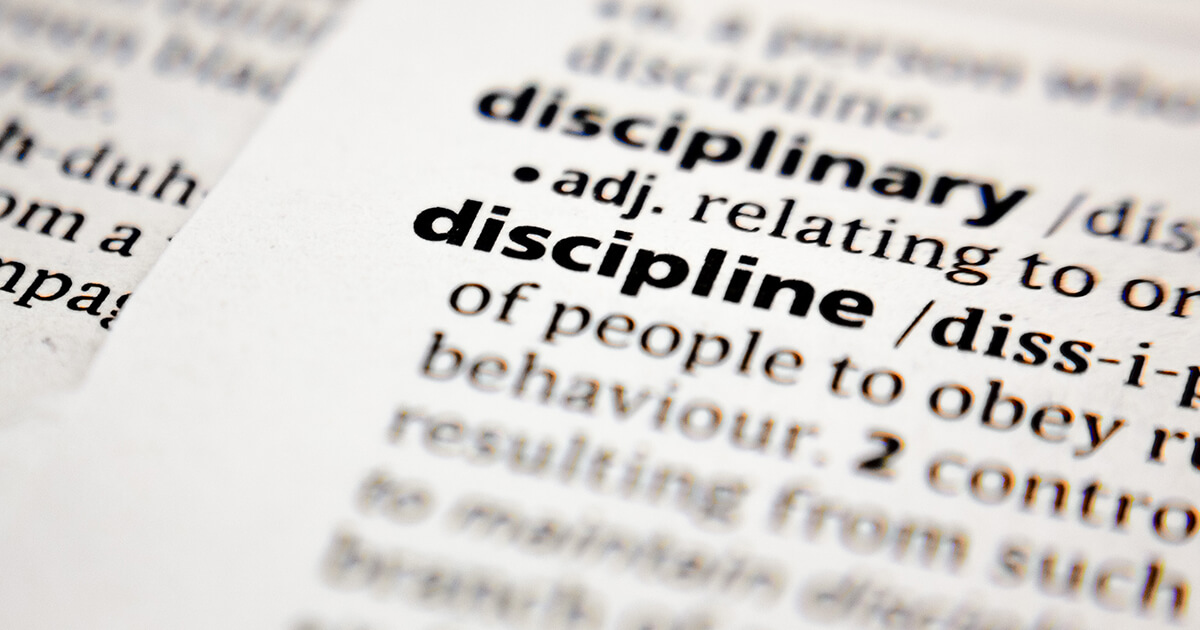Discipline. One word… thousands of opinions.
Is it punishment? Is it obedience?
Is it rules? Is it enforcement?
Is it always doing the same thing? Is it always doing the right thing?
Is it consistency? Is it doing what you’re told?
Is it rigid? Is it boring?
Do you even get a choice? Do you just comply?
To understand what discipline really is and what it really means, let’s look at the origin of the word to find its intent and true form.
The root word of discipline is “disciple,” which comes from the Latin word discipulus meaning “student.” Most people believe a disciple is a “follower” (probably because of the religious context), but in reality it means student—as in, “one who studies.”
The word “discipline” is from the Latin word disciplina, meaning “instruction and training.” It is derived from the root word discere—”to learn.”
So what is discipline?
Discipline is to study, learn, train, and apply a system of standards.
What isn’t discipline?
Discipline is not rules, regulations, or punishment. It is not compliance, obedience, or enforcement. It is not rigid, boring, or always doing the same thing.
Discipline is not something others do to you. It is something you do for yourself. You can receive instruction or guidance from one or many sources, but the source of discipline is not external. It is internal.
Discipline is not obedience to someone else’s standards to avoid punishment. It is learning and applying intentional standards to achieve meaningful objectives.
Discipline is a choice… your choice. It is a decision.
Better yet, all of your decisions.
The distinction between discipline being an external dynamic or an internal dynamic, a mandatory rule or a personal choice, is important. Understanding this at a deeper level is your gateway into a better, more discipline-driven life.
Do you see how it works?
When you understand discipline as a choice, you are in control—not anyone or anything else. More discipline, more choice, more control. Less discipline, less choice, less control.
Let’s use a common example…
I want to get up at 4:45am and workout. I have a four month-old son who usually wakes up at 6:00am and, like all babies, needs a lot of time and attention. I have to take care of him, make coffee, get myself ready, and leave for work by 7:30am.
So I need to workout before he wakes up… hence the 4:45am alarm.
My alarm goes off, I choose discipline, get up, workout, wake up my son, love on him, and leave for work. My first win of the day is in the books and my mind is clear to focus on my next priorities knowing my workout is done and I don’t have to “find the time” to make it up later. I’m in control of me and my day. I can even splurge a little at lunch or dinner because I worked out hard. I burned so I earned.
But what if I don’t choose discipline?
My alarm goes off, I choose default, sleep in, wake up my son, still love on him, and leave for work. I’m mentally and emotionally disappointed in myself because I should have gotten up and worked out. My mind is searching for when I can make it up. Tonight? Too busy, too late, too tired. Tomorrow? It was supposed to be my off day. Now I’m disappointed and distracted. I’m not in control of me or my day. I’m stressed and irritated, my discipline fades even further, so I make impulsive eating decisions at lunch and dinner because I’m already having an off-day. Might as well have be consistent.
Sound familiar?
The two scenarios described above translate to any scenario in any environment. When we maintain our own personal discipline, our choice, we retain control of ourselves and how we move through our environments.
When we lose our personal discipline, also our choice, we give control away to other people, external circumstances, and the inevitable randomness of life. We drift and become the plaything of circumstances (Viktor Frankl—”Man’s Search for Meaning”).
More discipline, more choice, more control. Better options. Higher standards. Improved skill. More flexibility.
Less discipline, less choice, less control. Fewer options. Lower standards. Inadequate skill. Less flexibility.
Go test this deeper understanding of discipline, what it is, how it works, and why it works. Observe yourself throughout the day. Observe other people. Measure these words against what you observe. Get out in the field and do the work.


